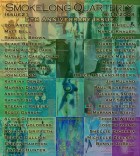You guest edited issue 7. What do you, as an editor, look for in a story? What about your own story “Tiny Shadows” fits this criterion?
The first thing any reader notices is the writing—use of language, sentence structure, rhythm, style, voice, all those qualities that are easy to name and so difficult to define. Taste plays a role here, of course, and that is why SmokeLong‘s system of editor conferencing (I’m not sure what to call it) is so effective. Editors respond blindly to a submission, after which they discuss their responses.
The next thing I look for is freshness. Is the piece interesting ? You might put it this way: Did I want to read the second sentence? Is the sensibility intelligent, witty, wise, funny—something that makes me nod or smile or raise my eyebrows or, at best, green with envy?
What in my story fits? Oh, I don’t know. It’s slight but it amused me to write it, so perhaps it amuses others to read it.
I find this man’s accomplishments, and his flaunting of them, amusing. They are so menial. But are they meaningless?
Interesting, if essentially unanswerable, question. What is meaning if not individually construed? Clearly, the subject’s accomplishments mean a great deal to him—apparently at the expense of his relationship. But that in itself isn’t amusing; it’s sad—and cliched. All I can tell you is that I wrote this flash as a response to a literary gossip event. That’s how I write a lot of flashes, actually—provoked by something external. It’s another way a writer responds to the world, I think: we laugh, we cry, we shake our fists at the stars, or we scribble something.
He puts his wife below all of his twenty-seven accomplishments, and yet he describes her handwriting as inimitable. So he is paying attention…
Yes. He is nothing if not attentive to detail. Perhaps—although it didn’t occur to me at the time—Prufrockian. (If it had occurred to me I probably would have added a coffee spoon, so perhaps just as well.)
Do you have any additional novels underway?
Yes, two, actually, though I rarely find time to work on them. This summer, I vow!
This issue marks SmokeLong‘s fifth anniversary, which has me thinking about longevity and growth. There’s no denying the literary arena is a fickle one, with journals coming and going, writers shooting onto the scene then falling into a long hiatus, editors changing houses, agents merging, and the trends! Don’t even get me started! How do you, as a writer, endure the ups and downs? Have you experienced any setbacks? What measures have you taken to grow?
No fair! You’re getting ME started! Yes, yes, I have experienced “setbacks.” I went through a lot of personal changes after my second novel came out: I divorced, my youngest went off to college, I sold my house, I changed cities, I began a new relationship, I turned down my publishers offer for my third novel (for various reasons), and I amicably parted ways with my agent who, at that point, was mostly interested in selling non-fiction.
Then I discovered I couldn’t sell the partial novel (a few chapters) as it was. But I also needed to support myself. So I started teaching and the rest is herstory. My publisher quickly let my novels go out of print, and I found myself so busy with becoming a certified secondary school teacher, I just let the writer part of me go. Well, not completely, of course.
But I’m OK with it. I’ve been exploring other paths, notably meditation and Buddhism, and my writing will only be enriched for that. I hope I publish another novel one day, just as I hope to live on the ocean. But if I never do either, that means I will have done other things. It’s all good!


